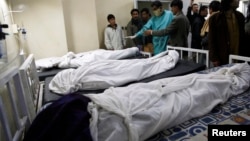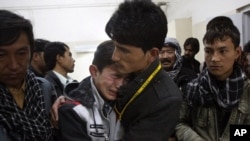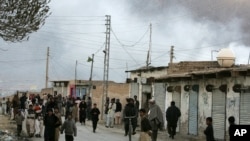ISLAMABAD —
Police in Pakistan say an apparent suicide bomb blast has killed at least 65 people and wounded nearly 200 in the southwestern city Quetta. Most of the victims are minority Shi'ite Muslims.
The bomb exploded Saturday evening in Quetta, the capital of Baluchistan province. Doctors say some of the wounded are in critical condition.
The city police chief, Mir Zubair Mehmood, tells VOA the powerful bomb ripped through a crowded vegetable and fruit market in a part of Quetta dominated by Shi'ite Muslims, locally known as the Hazara community.
“It was a water bowser [mobile water tank], which was towed behind a tractor, and that water bowser was loaded with the explosive material," Mehmood explained. "We estimate around 800 kilograms of explosive material was loaded in there. We can’t say definitely, but it appears it was a suicide attack and at that point in time there were a lot of people shopping.”
The police chief says the explosion caused the collapse of a two-story commercial building in the market, leaving many victims buried under the rubble.
A banned Sunni militant organization, Lashkar-e-Jhangvi, has claimed responsibility for Saturday’s bombing.
A leader of the ethnic Hazara community, Abdul Khaliq Hazara, tells VOA repeated attacks are meant to drag them into a sectarian conflict in Quetta and force them to leave the city.
“They provoke us to be involved in a civil war. We are very peace-loving people," Hazara insisted. "We never want to be involved in terrorist activities. We are education-oriented people. We are peaceful people. We want progress in the city.”
The Shi'ite leader reiterated a demand for the Pakistani military to take control of the city, alleging the police and paramilitary forces have failed to provide them security.
The Dari-speaking Hazars migrated to Pakistan from neighboring Afghanistan more than a century ago and have mostly settled in Quetta.
Saturday’s incident is the second deadliest attack on the Shi'ite community in the city this year. A double bombing January 10 killed 92 people. Relatives as well as leaders of the Shi'ite community were so angry that they refused to bury their dead for days.
The protest ended after Pakistani Prime Minister Raja Pervaiz Ashraf dismissed the provincial government and imposed direct federal rule in Baluchistan.
The provincial governor says Sunday will be a day of mourning across the province, while parties representing the Shi'ite community have called a strike in Quetta to protest the latest attack.
Human rights groups say sectarian attacks have increased recently in predominantly Sunni Pakistan, where last year more than 400 Shi'ite Muslims were killed. Sunni extremists view the Shi'ites as heretics and non-Muslims.
The bomb exploded Saturday evening in Quetta, the capital of Baluchistan province. Doctors say some of the wounded are in critical condition.
The city police chief, Mir Zubair Mehmood, tells VOA the powerful bomb ripped through a crowded vegetable and fruit market in a part of Quetta dominated by Shi'ite Muslims, locally known as the Hazara community.
“It was a water bowser [mobile water tank], which was towed behind a tractor, and that water bowser was loaded with the explosive material," Mehmood explained. "We estimate around 800 kilograms of explosive material was loaded in there. We can’t say definitely, but it appears it was a suicide attack and at that point in time there were a lot of people shopping.”
The police chief says the explosion caused the collapse of a two-story commercial building in the market, leaving many victims buried under the rubble.
A banned Sunni militant organization, Lashkar-e-Jhangvi, has claimed responsibility for Saturday’s bombing.
A leader of the ethnic Hazara community, Abdul Khaliq Hazara, tells VOA repeated attacks are meant to drag them into a sectarian conflict in Quetta and force them to leave the city.
“They provoke us to be involved in a civil war. We are very peace-loving people," Hazara insisted. "We never want to be involved in terrorist activities. We are education-oriented people. We are peaceful people. We want progress in the city.”
The Shi'ite leader reiterated a demand for the Pakistani military to take control of the city, alleging the police and paramilitary forces have failed to provide them security.
The Dari-speaking Hazars migrated to Pakistan from neighboring Afghanistan more than a century ago and have mostly settled in Quetta.
Saturday’s incident is the second deadliest attack on the Shi'ite community in the city this year. A double bombing January 10 killed 92 people. Relatives as well as leaders of the Shi'ite community were so angry that they refused to bury their dead for days.
The protest ended after Pakistani Prime Minister Raja Pervaiz Ashraf dismissed the provincial government and imposed direct federal rule in Baluchistan.
The provincial governor says Sunday will be a day of mourning across the province, while parties representing the Shi'ite community have called a strike in Quetta to protest the latest attack.
Human rights groups say sectarian attacks have increased recently in predominantly Sunni Pakistan, where last year more than 400 Shi'ite Muslims were killed. Sunni extremists view the Shi'ites as heretics and non-Muslims.











